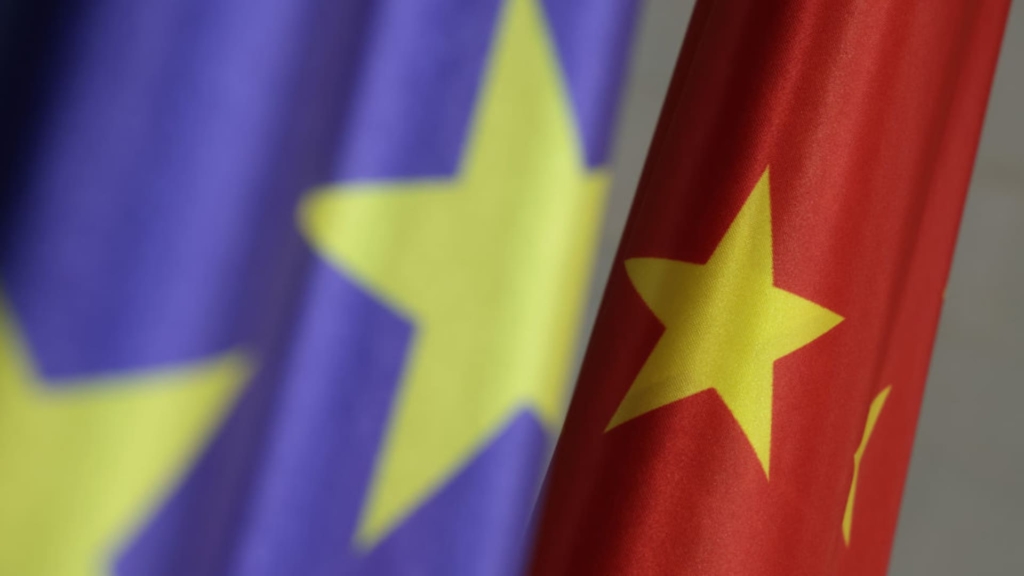Analysts predict that a close alliance between China and the European Union is far from imminent, despite the strain in relations between the United States and both partners due to President Donald Trump’s tariffs.
“I don’t foresee a coalition forming between the EU and China against the US,” said Max Bergmann, director of the Europe, Russia, and Eurasia Program at the Center for Strategic and International Studies (CSIS).
While there may be opportunities for increased geopolitical engagement, significant trade tensions and competitive issues are substantial barriers, according to Bergmann. “The potential for economic alignment between the EU and China is restricted since both are export-driven economies that compete fiercely, particularly in the automotive and clean technology sectors,” he said. He added, “There is interest from both sides, but practical limitations remain. Unless China is prepared to make substantial concessions, I find it difficult to envision the EU rallying behind a plan for deeper cooperation.”
Current Challenges in EU-China Relations
The relationship between the EU and China is complicated. Despite China being one of the EU’s largest trading partners, alongside the United States, historical interactions have often involved disputes and reciprocal trade measures.
The EU has consistently accused Beijing of subsidizing key sectors such as electric vehicles, batteries, and steel, practices that it claims undermine global market competitiveness. Last year, the EU responded by imposing tariffs on Chinese electric vehicles.
In retaliation, China initiated anti-dumping investigations into EU products, including pork and brandy, along with an anti-subsidy probe into EU dairy exports.
Tensions extend beyond trade issues, as Carsten Nickel, managing director at Teneo, emphasized. He noted that fundamental differences between the EU and China persist, irrespective of the dynamics with the US. “These include unresolved concerns regarding China’s overcapacity, persistent human rights issues highlighted by the European Parliament, and apprehensions about China’s backing of Russia amid the Ukraine conflict,” he explained.
Ian Bremmer, founder and president of the Eurasia Group, pointed out a significant mistrust in Europe towards China related to intellectual property rights and technological surveillance, as well as industrial policies. This scepticism remains present even with the US evolving into an adversary.
Exploring New Connections
Conversely, some European officials may consider a strategy of balancing interests between the US and China, potentially negotiating reduced support from China for the Russian defense sector while encouraging economic engagement.
Recent developments hint at a budding connection between China and the EU. Reports indicate they are exploring the implementation of minimum pricing for Chinese electric vehicles to replace existing tariffs. On Friday, Spanish Prime Minister Pedro Sanchez met with Chinese President Xi Jinping in Beijing, urging for a more equitable relationship. Earlier in the year, Chinese Foreign Minister Wang Yi visited Europe to advocate for enhanced cooperation.
Moreover, European Commission President Ursula von der Leyen and Chinese Premier Li Qiang recently engaged in discussions. According to a European Commission readout, von der Leyen stressed China’s crucial role in addressing trade diversions instigated by tariffs and urged for a negotiated resolution.
The tone from the European side appeared notably less confrontational than in previous interactions, as highlighted by Nickel of Teneo.
Prospects for the Future
Nickel emphasized the focus on managing the complexities facing the global economy. “It’s evident that the underlying issues in EU-China relations will not be resolved quickly,” he stated. The US’s tariff actions may complicate the situation further, potentially exacerbating challenges like China’s overcapacity in exports.
Analysts from the Eurasia Group, Emre Peker and Mujtaba Rahman, echoed this sentiment in a recent note. “As the US-China tariff dispute escalates, trade diversions will compel the European Commission to implement safeguard measures against potential dumping of goods from China and other countries,” they observed.
Furthermore, the analysts noted that Trump’s tariffs will likely prompt Brussels to adopt a more stringent trade approach towards Beijing, exceeding current measures intended to address economic imbalances detrimental to European industry.
At the same time, European policymakers may adopt a more diplomatic stance towards China to prevent igniting a trade conflict on multiple fronts, although such an approach will probably not result in a united front with Beijing against the US.


























